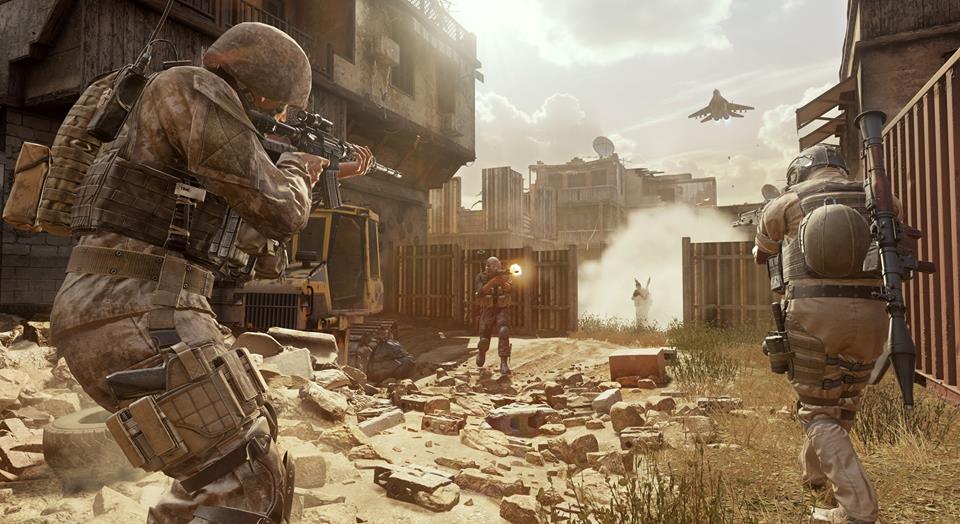Could video games be the future of warfare?
Tomorrow's battles could be waged in a virtual world


A free daily email with the biggest news stories of the day – and the best features from TheWeek.com
You are now subscribed
Your newsletter sign-up was successful
Is violence a part of the human psyche? Is our species doomed to a future of war and bloodshed?
Some people think mankind can no sooner abandon war than it can free itself from the constraints of the physical body. Indeed, conflict exists in everything we do. As children, we wrestle with our siblings. We bully. We fight over the best seat near the window. As adults, we argue in our jobs and relationships. We fight outside bars. Nations battle over resources and politics. Conflict is so deeply rooted in our beings that there may not yet be a sane way to eliminate it entirely. And yet, change is the very nature of evolution, and even with stories of everyday violence and heartbreaking crime raging in the media, it's possible that someday, violent acts of war will be a thing of the past. Our battles will take place not on a field, but in virtual worlds.
Virtual reality has seen massive leaps in innovation recently. The worlds that exist in these realities could act as holographic versions of the lives we lead offline, allowing us to play out warfare scenarios with real-life geopolitical outcomes but without the deadly consequences. Take, for example, one of the greatest virtual reality platforms created in the past few decades: Second Life. In this "game" — for lack of a better word — every chunk of virtualized land, every island, every city, and every nation, is owned by a Second Life user. Such a world could serve as a platform on which we could address real-world problems that are too complicated, or too violent, to address in real life. War could be waged in a virtual reality setting and the results deemed internationally binding — saving hundreds of thousands of lives in the process.
The Week
Escape your echo chamber. Get the facts behind the news, plus analysis from multiple perspectives.

Sign up for The Week's Free Newsletters
From our morning news briefing to a weekly Good News Newsletter, get the best of The Week delivered directly to your inbox.
From our morning news briefing to a weekly Good News Newsletter, get the best of The Week delivered directly to your inbox.
Putting this idea into action would be difficult, no doubt. The first barrier would likely be the lack of an international consensus. After all, what could possibly force a sovereign nation to respect the outcome of a CS:Go match in real life? In the absence of actual force, surely they would dismiss the results of such a competition, should they lose. But this could change in the aftermath of a massive, devastating act of violence. After World War II, for example, we saw nations from different parts of the world, big and small, come together in an effort to establish global peace and stability. Perhaps a similar consensus — a mutual craving for international peace — could be established in an effort to rule out violence and push for virtualized conflict.
Implementing video games as a proper replacement for armed warfare would also alter the global balance of power completely. A nation's status would no longer be determined by its resources and manpower, but by the gaming prowess of its citizens. Today's professional electronic sports gamers could be tomorrow's warriors.
In a way, video games are already being utilized by modern militaries. The United States Marines use war-centric video games as a means to gather new recruits, train existing soldiers, and treat veterans suffering from post-war mental disabilities. Realistic war simulators such as Call of Duty and Battlefield are used today to entice new recruits into the world of adrenaline-filled action. So why not use these very games to replace warfare altogether?
It's perhaps a bit idealistic — and maybe even childish — to consider virtual reality video games a suitable replacement for warfare. But morally, there is nothing wrong with the idea. With the world of science and technology advancing at a rapid pace, what seemed incomprehensible yesterday will be mundane tomorrow. As Mahatma Gandhi once said: "If liberty and democracy are to be truly saved, they will only be by non-violent resistance no less brave, no less glorious, than violent resistance. And it will be infinitely braver and more glorious because it will give life without taking any."
A free daily email with the biggest news stories of the day – and the best features from TheWeek.com
Harold Stark is a technology columnist for The Week. A journalist covering the broad intersection of lifestyle and technology, he wields his pen for a variety of online publications, the most important of them being Forbes Magazine and The Week. There is some serious talk about him being a descendent from one of the seven noble houses of Westeros, though such allegations have never been actually proven. Try unearthing evidence against him by following him @realharrystark.
-
 Health insurance: Premiums soar as ACA subsidies end
Health insurance: Premiums soar as ACA subsidies endFeature 1.4 million people have dropped coverage
-
 Anthropic: AI triggers the ‘SaaSpocalypse’
Anthropic: AI triggers the ‘SaaSpocalypse’Feature A grim reaper for software services?
-
 NIH director Bhattacharya tapped as acting CDC head
NIH director Bhattacharya tapped as acting CDC headSpeed Read Jay Bhattacharya, a critic of the CDC’s Covid-19 response, will now lead the Centers for Disease Control and Prevention
